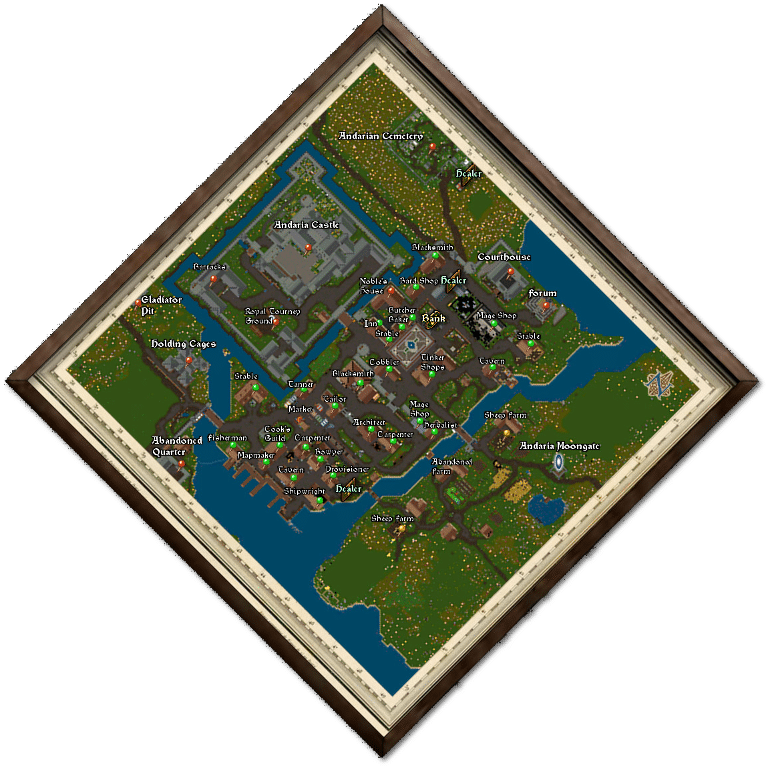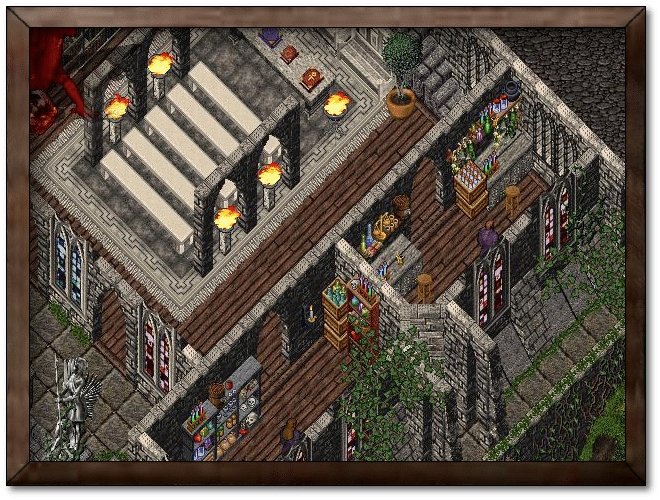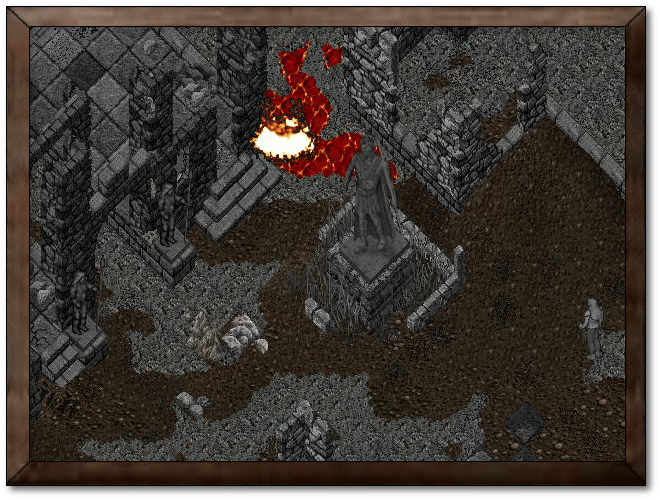Andaria

The History of Andaria
Credit goes to Lenz for the original lore and also to Erik Gray for the amazing posts and images.
The Humble Beginnings
The Kingdom of Andaria is one of the two oldest Kingdoms in all the Realm, with Cambria being the other. Andaria was founded about 140 years after the Cataclysm that shaped Avadon into what it is today. From the ruins of old Britain, this new city sprung up, the architecture and stonework reminiscent of the ancient destroyed former capital of Britannia.

The weather in Andaria tends to favor the cold. As the lands of Avadon formed, polar ice caps covered across much of the greater northern regions, of which Andaria is betwixt two. As such, there is a stark chill in the Andarian air for most of the year, with enough sun and warmth during the late spring and summer to allow for moderate farming. However, due to the shortened harvest season, the people of Andaria do not always have as full a table as they would otherwise enjoy.
In spite of this, Andarians are incredibly industrious people. Their ability to create great stone structures rivals that of either Prevalia or Cambria. One of the crowning structural achievements of Andaria is the Mage's Guild.
War with Prevalia
Not much is known about the rise of Andaria during its early years. A combination of inconsistent record-keeping and constant wars made Andarian (and Cambrian) history spotty at best. However, it would appear that the Andarians more or less were isolated in the north until about 251 AC when Prevalian forces for the first time reached the Andarian borders. Conflict broke out immediately between Prevalia and Andaria, with a great deal of blood being spilled on Andarian soil. Andarians never had to fight in a war before, and as such they were green and unseasoned in comparison to the Prevalian armies which was comprised mainly of veteran soldiers who fought for over a decade against the monster tribes of the Outlands.
The Andarians, in spite of their green recruits early in the conflict, became staunch defenders of their homeland. Where they lacked in experience and training, they made up in passion and conviction to defend their homeland. Andaria held their southern border for over a decade against Prevalian assaults. However, the Andarians knew this was an untenable situation. They were ultimately losing more soldiers than inflicting casualties, and their resources waned. It was decided that the Andarians would go on the offensive in an attempt to push the Prevalians away from their borders, bringing to mind the adage ‘the best defense is a good offense.’
In the year 287 AC, the Andarian army marched through the lowlands of Prevalia, seeking to attack Lower Prevalia, as it was more strategically open to assault than Upper Prevalia which was situated high upon white cliffs. The Prevalian King sent his army to intercept the Andarian force, and the two armies clashed in the town of Ardun, south-west of Lower Prevalia. The battle left Ardun completely destroyed, and the Andarian forces decimated.
After the pivotal battle of Ardun and having learned that the Kingdom of Cambria had submitted to Prevalia, as well as having no military force to continue its campaign against Prevalia, Andaria submitted to Prevalian rule.
The Prevalian Golden Age
In around 315 AC, Andaria had built up a modest force and joined it to the combined forces of Prevalia and Cambria in a joint effort to push back against the Orc, Lizardman, and Ratman tribes that proliferated the Outlands. Two noble families, The Hosenfields and Schmaltburgers of Andaria were tasked with defeating Thelmhurst, the Lord of Trolls, and Utaruk, the King of Orcs. A matter in which the Andarians were successful. This time period is often hailed as the Prevalian Golden Age, a time when all three Kingdoms were at peace and trade flowed freely from both land and sea.
The Prevalian Emperor Laric in 327 AC began the practice of marrying his sons into the royal families of both Cambria and Andaria, which is a practice that the Andarian nobility welcomed. This strengthening of family bonds also strengthened Andaria politically.
War and the Expansion of Power
In 348 AC, Andaria’s recovery from the previous war with Prevalia more or less reached its summit and began eyeing expanding its power and influence. An Andarian survey team found what they felt was a perfect location for a stone keep that would help protect the southern Andarian coast and serve as a military outpost. Thusly, Outpost was founded, strengthening Andaria’s grip on the north.
An uneasiness set in the Andarian Kingdom during the years of 441-490 AC, a time that became known as the “Reign of the Mad Emperors.” A succession of three brutal an unhinged Prevalian Emperors greatly battered the relationship Prevalia had with both Andaria and Cambria to the point where, in 491 AC, Andaria formally seceded from the Prevalian Empire and war against Prevalia for a second time began the following year.
In spite of the war efforts on its southern borders, Andaria still sought to expand its power and influence across a wider swatch of the Avadonian mainland. To that end, Andarian settlers re-founded the ancient and lost city of Cove on the western coast in 559 AC. Cove, along with Outpost, gave Andaria a coast-to-coast power base across the entire northern part of the continent.
The Height of Andarian Supremacy
During the years of 561-570 AC, the infamous Lord Landau and the Dark Banner Company hired themselves out to whichever of the three Kingdoms that could afford their services. Queen Klara of Andaria invited Captain Landau to meet face-to-face to hire on the Dark Banner Company to fight for Andaria.
The following 15 years saw a world helmed by Andarian superiority. Queen Klara and Lord Landau married and together led the most powerful military that even outshined that of Prevalia. Andaria soundly defeated by Cambria and Prevalia in battle after battle during these years.
The Invasion of Andaria

In the year 585, Queen Klara gave birth to a son and heir, Luka, the future King of Andaria. Later during this same year, an incredibly massive Orc army sailed to the southern coast of Andaria through the Spirituality Bay. Both Queen Klara and Lord Landau led their forces against the might of the Orc Warlord Goth Vultog. The battle was long and bitter, and in the ensuing chaos, Queen Klara was slain.
It is said that upon the Orcs being defeated, Lord Landau in his cruel rage savagely executed every single prisoner. Upon completing this task, Lord Landau left Andaria for Corpse Creek, leaving his infant son in the care of the now governing Regent Marius of Andaria. With the loss of both of its strongest military leaders and having suffered a terrible blow by the surprise Orc invasion, the Andarian forces pull back from their further borders to protect their homeland.
In 594 AC, the Orc tribes gathered under the new leadership of Goth Yubgub, who is rumored to have had a mysterious advisor at his side. Goth Yubgug laid siege to the Andarian city of Cove and razed it to the ground. The fires still burn to this day.
The Regency
A year later it is Cailith the Sagacious of the Andarian Mage Council who posited the theory that the mysterious influencer of the Orcs and some of the mercenary companies are none other than the Shadowlords. It is uncertain as to whether or not there is any proof of these claims or if they are mere suspicions.
In the year 604 AC, Luka, the rightful heir to the Andarian throne, left Andaria in the middle of the night and rode for Corpse Creek where he took up his father’s mantle as head of the Dark Banner company. Afterwards, Luka led his army on raids deep into both Prevalian and Cambrian lands. A year later, he even raided Andarian lands, much to the dismay of the Andarian people who were his subjects. In spite of his raids, there remains to this day a strong contingent of support for Luka as the rightful King of Andaria.
In the same year as the Andarian raids (605 AC), the governing Regent Marius went missing under unknown circumstances. Rumors abound that a black moongate was spotted within Luka’s field encampment around this time, so if there was a connection between the gate and the disappearance of Regent Marius, it is unknown. Cailith the Sagacious replaced Marius as the governing Regent of Andaria and sought to legally remove Luka from his claim to the Andarian throne, as Luka was reluctant to rise up and claim the throne, instead he opted to remain at the head of the Dark Banner Company.
The Peace That Never Was
Facing an uncertain political future, under the governance of a foreign-born Regent and a rightful King who would rather raid his own country than rule it, the Andarian people were ready to put aside their swords and sue for peace.
During the year of 609 AC, the rulers of all three Kingdoms met to discuss peace for the first time in a long time. The Prevalian King and his son attended, as did the Cambrian King. Regent Cailith sent a trusted diplomat to take his place during these talks. Nobody knows what happened that fateful day. The rulers sat down to talk in the Ancient Glade and sent away their guards and generals. When the guards and generals returned, all of the rulers had vanished and a black moongate was present. Each Kingdom’s generals blamed the other Kingdoms for the disappearance of the rulers, and each retreated back towards their own lands. However, a great deal of suspicion fell upon Luka as the mastermind behind the disappearances.
The faction within Andaria that still supports Luka’s claim to the Andarian throne remains to this day, slowly undermining Cailith the Sagacious’ work as Regent. Because of his Cambrian descent, he also lost favor in court and among the general populace as he is seen as an outsider.